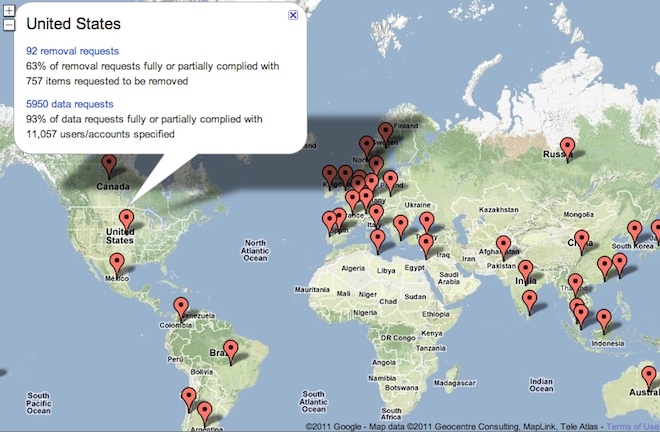U.S. law enforcement demands for Google users’ personal information surged in the past six months by 29 percent over the previous six months according to new data released Tuesday by Google, the only online company to release such statistics.
“We believe that providing this level of detail highlights the need to modernize laws like the Electronic Communications Privacy Act, which regulates government access to user information and was written 25 years ago–long before the average person had ever heard of email,” wrote Dorothy Chou, a senior policy analyst at Google in a Tuesday blog post. “Yet at the end of the day, the information that we’re disclosing offers only a limited snapshot. We hope others join us in the effort to provide more transparency, so we’ll be better able to see the bigger picture of how regulatory environments affect the entire web.”
Google began releasing the data last year, but obviously law enforcement authorities around the world, including the United States, have been demanding the information ever since it was available.
Google reports that it complied with almost all (93%) of the 5,950 requests for user information in the United States. In all, the law enforcement authorities demanded access to more than 11,000 accounts.
In notes accompanying the numbers, Google said: “The number of requests we receive for user account information as part of criminal investigations has increased year after year. The increase isn’t surprising, since each year we offer more products and services, and we have a larger number of users.”
As the data shows, Google receives law enforcement demands for user information and data removal (for example, the takedown of a YouTube video) in countries around the world, but the demands for the information in the United States remain the highest.
While the numbers serve as an interesting reminder that the law-enforcement authorities are doing their jobs, they don’t give us the full picture of U.S. government demands on user information.
The USA PATRIOT Act, for example, all allows the FBI to secretly demand user information from services like Google and internet service providers. In most areas of the country, the FBI can require the ISP to refrain from informing their subscribers about the demand for their data.
But the law that Google and the Due Process Coalition say needs updating is the Electronic Privacy Communications Act, which was enacted before the era of e-mail and cloud-computing were upon us. The basic problem is that very little of our personal information and logs of our activities that is being stored about us online is protected, and law enforcement authorities can access it at any time without much oversight.
That reality was brought into stark relief earlier this month when the Wall Street Journal reported that the U.S. government had demanded the user data of the security researcher and Wikileaks supporter Jacob Appelbaum from both Google and Santa Rosa, Ca.-based ISP Sonic.net.
That’s not only problematic for individuals’ concerned about law-enforcement overreach. It’s also a potentially big and time-consuming problem for technology companies that don’t want to spent a lot of time and money complying with the requests at the same time as paying lawyers to figure out what information they can legally dole out to the authorities.
That’s why so many of the top names in technology — Apple, Adobe, Amazon, AT&T, Facebook, IBM, LinkedIn and many others in addition to Google, have teamed up with the American Civil Liberties Union and the Electronic Frontier Foundation, among others, to call for an update to the law.
Sen. Pat Leahy, (D-VT,) chairman of the Senate Judiciary Committee, has authored a bill to update the law. Last week, he promised that the committee would move the legislation out of committtee by the end of the year.
“Before the end of the calendar year, the Judiciary Committee will consider legislation that I have drafted to update the ECPA and to bring this law fully into the digital age,” Leahy said in a press statement last week commemorating the 25th anniversary of the law. “I hope that all Members will join me in commemorating this important milestone anniversary and in supporting the effort in Congress to update this law to reflect the realities of the digital age,”
Many of the companies, as well as digital rights activists, will be sure to be discussing Google’s statistics, as well as how they can push for reform, at a Silicon Valley Human Rights conference taking place Tuesday and Wednesday in San Francisco.






